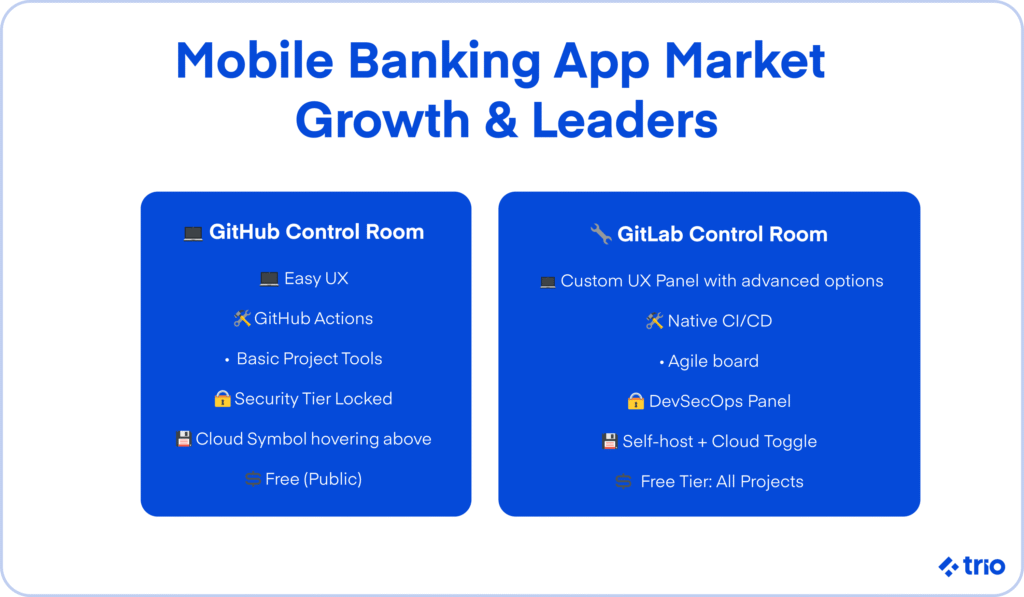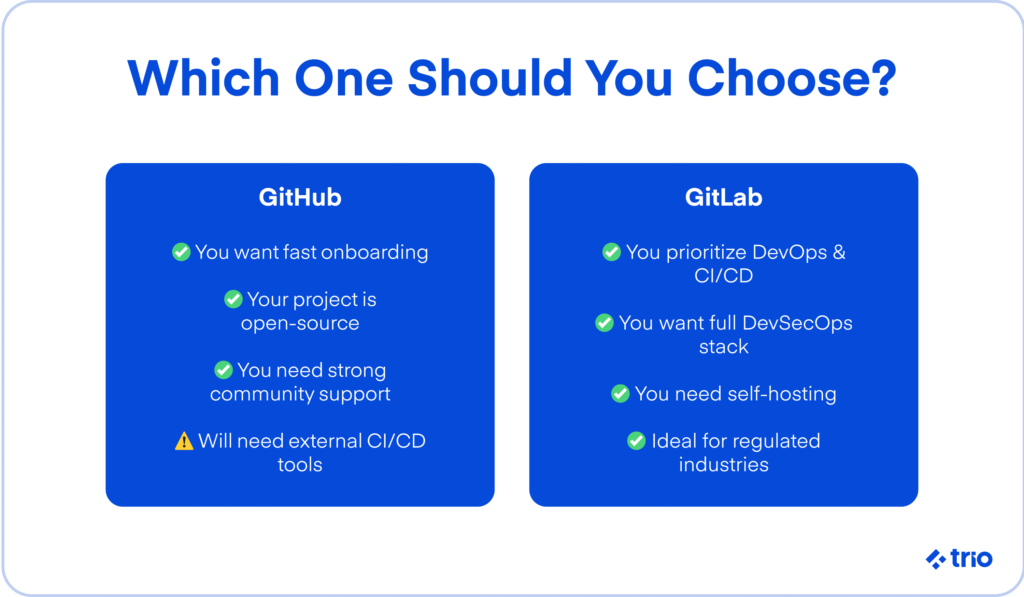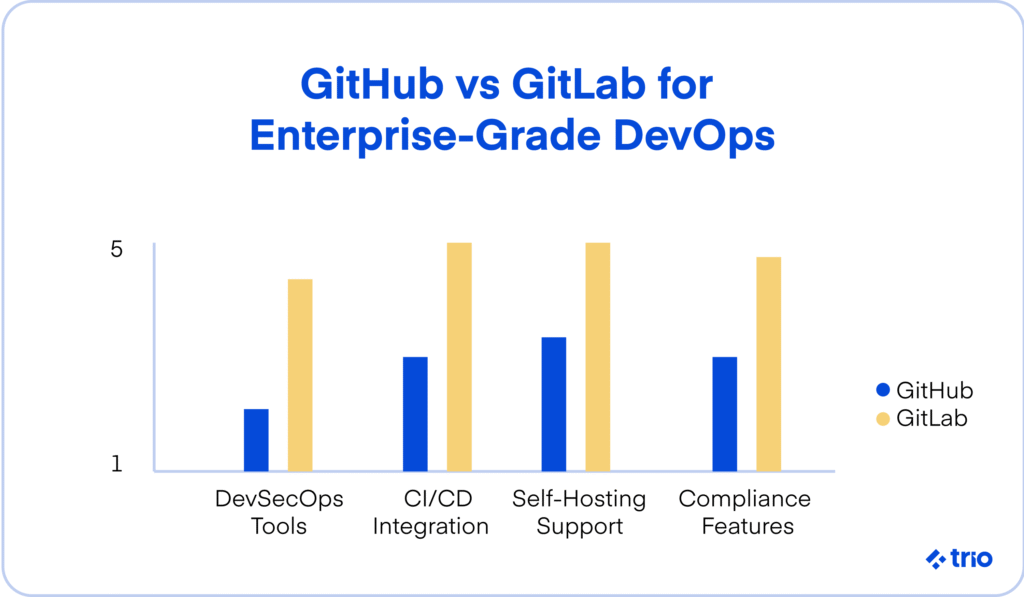GitHub vs Gitlab. Both are Git-based development platforms, but they have very different strengths. Knowing which one is the best option for your workflow, team size, and ecosystem can save you time and money in the long run and can prevent unnecessary frustration.
The main difference between GitHub and GitLab is that GitHub relies on a community that collaborates and third-party integrations. GitLab offers a unified DevOps experience, with native CI/CD, which usually makes it better for enterprises. Of course, there are many other differences, which we will go through below.
At Trio, our developers have extensive experience in both GitLab and GitHub. They will be able to use whichever option you decide to go with, and can advise you on which may be the best option for your own development process. And, our staff augmentation and outsourcing hiring models mean you don’t have to commit to hiring developers beyond when you need them.
Let’s go through everything you will need to know to guarantee your software development success.
What is Git? (Version Control Fundamentals)
Git is a distributed version control system. It’s quite popular because it can handle large projects without much problem, making it a great option for companies of all sizes.
But using Git, your developers can work on the same codebase at the same time, tracking changes, branching, and even merging their code.
It is so popular that over 90% of developers have worked with Git at some point, or are at least familiar with it in some way.
How GitHub and GitLab Build on Git
GitHub and GitLab allow you to build on Git.
They act almost like a user interface, providing all the tools that you may need to work on Git. In many cases, they make Git far more user-friendly, and let you pull or merge requests, track issues, integrate CI/CD, and anything else you could want.
Git vs. GitHub vs. GitLab (Clear definitions)
Let’s clarify the differences between Git, GitHub, and GitLab through some simple definitions.
- Git: A version control system that tracks your code and its changes.
- GitHub: A platform that hosts Git repositories with features like pull requests, GitHub Actions, and a big open-source community.
- GitLab: A platform that hosts Git repositories with a strong emphasis on DevOps integration, built-in CI/CD, security testing and scanning, and large-scale project management.
GitHub vs Gitlab Similarities
There are several similarities that make either option suitable for most companies.
Both are run on Linux servers and support open-source projects. They utilize mixed-programming models that offer a wide variety of integrations with third-party tools across free and paid plans.
Along with that, both offer cloud storage, issue trackers, and basic tools for project management.
Difference Between GitHub and GitLab: Features Comparison
While both platforms allow you to collaborate on Git repositories effectively, there are several key differences between GitLab and GitHub that will make one option more suitable than the other. These differences span developer experience, CI/CD capabilities, project management tools, security, compliance, hosting options, pricing, and community.
| Category | GitHub | GitLab |
| Code Collaboration Experience | Easy-to-use interface, with simple onboarding. | Customization capabilities for your merge request. It has a more comprehensive DevOps platform. |
| Learning Curve | Very beginner-friendly and easy to learn, especially for startups launching their first product. | GitLab has a very steep learning curve, but it can empower developers with its more advanced features. |
| Project Management Tools | GitHub-based Projects and Issues are good and can be enhanced with third-party software. | Has a very good variety of Agile tools to manage your development lifecycle, like milestones, issue boards, and epics. |
| CI/CD | GitHub Actions are great, but often need a third-party setup. | Native CI/CD pipelines. Unlimited self-hosted runners. |
| Security and Compliance | GitHub Advanced Security is comprehensive, but only available with enterprise-grade plans. | Has a variety of Native DevSecOps tools like SAST, DAST, and secret scanning. |
| Hosting Options | Mostly cloud hosting. GitHub Enterprise Server for self-hosting. | Flexible hosting options. Open-source Community Edition. Strong support for self-hosting. |
| Pricing | Great free tier (public repositories) with costs for additional features. | Very extensive free tier (public and private repositories) with great value for money in higher tiers. |
| Community | Incredibly large open-source community with rich ecosystem. | Strong enterprise community, growing well. |

Use Cases & Strengths
While there is a very big overlap, often one will clearly be the better option for you. One is not clearly better than the other. It depends on your specific project and team preferences.
When to Choose GitHub
GitHub is probably the best option if you are working on open-source projects and have a team that likes to work with external tools and knows how to integrate these tools efficiently.
Since GitHub offers a very simple user interface, it is also the best option if you need to prioritize user-friendliness. It’s a great option for startups or small teams who need quick setup and community support.
It is also a great option for remote workers thanks to its ability to integrate with tools that have collaboration features, like Slack or Jira, a tool by Atlassian.
However, GitHub offers very limited services in terms of continuous integration and continuous delivery or deployment (CI/CD) and requires third-party tools. If you have extensive CI/CD needs, it might be time to switch to GitLab.
When to Choose GitLab
GitLab is an all-in-one solution. It’s the best option if you want a unified platform for DevOps with incredible customization options, and if your security and compliance needs are your priority.
As mentioned above, the combination of security and compliance tools, as well as customizability, makes it an amazing option for enterprises. Especially those in regulated industries like fintech, healthcare, and education.
It is definitely the better option if you are self-hosting too.

Advanced Capabilities for Growing Teams
There are certain advanced capabilities that are essential for growing teams.
Infrastructure as Code (IaC)
GitHub and GitLab provide support for IaC tools. GitLab includes native registry support for many, like Terraform, and also has templates to make managing your infrastructure faster.
The native support and template availability make GitLab a slightly better option in terms of workflow automation.
Kubernetes and Containerization
GitLab has more integrated Kubernetes support, like the templates we’ve already mentioned.
GitHub Actions and integrations also support Kubernetes, but your developers will need to put more time into setup and configuration.
GitOps & DevSecOps Features
Thanks to the integration between code and CI/CD, GitLab definitely has an edge when it comes to GitOps workflows.
The platform’s built-in scanning and policy tools also support advanced DevSecOps practices, as we have already discussed, without you needing to use any external tools.
Enterprise-Readiness & Scalability
GitLab’s nature as a self-hosted, all-in-one platform and its automated testing abilities for compliance and security mean that it is a great option for enterprises with very specific project requirements in those areas.
GitHub Enterprise is specifically designed for scalability. But it does focus more on cloud-based scaling and integrations. This makes it a better option for SaaS applications.

Making the Right Choice
It can be difficult to make the right decision for your own project. When there are free tiers for both options, choosing between GitHub and GitLab may seem like it isn’t a big priority, but it can make a massive difference in your development speed and capabilities.
Our developers have helped a variety of clients choose the right option for them. If you are interested in development on either GitHub or GitLab, or need help choosing the best option for you, we can help.
At Trio, we hire the top 1% of developers. We don’t just provide you with a one-size-fits-all solution; instead, we figure out all the specifics of your project, your needs and preferences, and connect you with a perfect fit.
We also make use of offshore and nearshore developers from LATAM and Africa to provide these high-quality developers at cost-effective rates. Reach out to schedule a free call and get started!